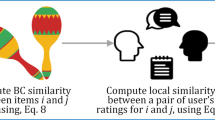Abstract
Traditionally, data sparsity is seen as a key disadvantage of user-based CF. It is often assumed that data sparsity may cause small number of co-rated items or no such ones between two users, resulting in unreliable or unavailable similarity information, and further incurring poor recommendation quality. However, the analysis process is often not experimentally verified. To make a detailed analysis, the effects of the data sparsity on user-based CF are experimented with three steps. Firstly, the relationships between the data sparsity and the number of co-rated items are investigated. Secondly, the characteristics of the number are explored. Thirdly, the effects of the number on the recommendation quality are evaluated. Experimental results show that: a) as data sparsity increases, the number of co-rated items doesn’t drop, and b) recommendation quality doesn’t drop as the number of co-rated items decreases. These results show that the traditional analysis about the effects of data sparsity is problematic. We hope that this new conclusion about the effects of data sparsity can provide implications for the design of CF algorithms.
Access this chapter
Tax calculation will be finalised at checkout
Purchases are for personal use only
Preview
Unable to display preview. Download preview PDF.
Similar content being viewed by others
References
Herlocker, J.L., Konstan, J.A., Borchers, A., Riedl, J.: An algorithmic framework for performing collaborative filtering. In: Proceedings of the 22nd Annual International ACM SIGIR Conference on Research and Development in Information Retrieval, pp. 230–237. ACM, New York (1999)
Sarwar, B., Karypis, G., Konstan, J., Reidl, J.: Item-based collaborative filtering recommendation algorithms. In: Proceedings of the 10th International Conference on World Wide Web, pp. 285–295. ACM, New York (2001)
Adomavicius, G., Tuzhilin, A.: Toward the Next Generation of Recommender Systems: A Survey of the State-of-the-Art and Possible Extensions. IEEE Trans. on Knowl. and Data Eng. 17(6), 734–749 (2005)
Grčar, M., Mladenič, D., Fortuna, B., Grobelnik, M.: Data Sparsity Issues in the Collaborative Filtering Framework. In: Nasraoui, O., Zaïane, O.R., Spiliopoulou, M., Mobasher, B., Masand, B., Yu, P.S. (eds.) WebKDD 2005. LNCS (LNAI), vol. 4198, pp. 58–76. Springer, Heidelberg (2006)
Bobadilla, J., Serradilla, F.: The effect of sparsity on collaborative filtering metrics. In: Proceedings of the Twentieth Australasian Conference on Australasian Database, vol. 92, pp. 9–18. Australian Computer Society, Inc., Darlinghurst (2009)
Author information
Authors and Affiliations
Editor information
Editors and Affiliations
Rights and permissions
Copyright information
© 2012 Springer-Verlag Berlin Heidelberg
About this paper
Cite this paper
Hu, B., Li, Z., Chao, W. (2012). Data Sparsity: A Key Disadvantage of User-Based Collaborative Filtering?. In: Sheng, Q.Z., Wang, G., Jensen, C.S., Xu, G. (eds) Web Technologies and Applications. APWeb 2012. Lecture Notes in Computer Science, vol 7235. Springer, Berlin, Heidelberg. https://doi.org/10.1007/978-3-642-29253-8_55
Download citation
DOI: https://doi.org/10.1007/978-3-642-29253-8_55
Publisher Name: Springer, Berlin, Heidelberg
Print ISBN: 978-3-642-29252-1
Online ISBN: 978-3-642-29253-8
eBook Packages: Computer ScienceComputer Science (R0)




